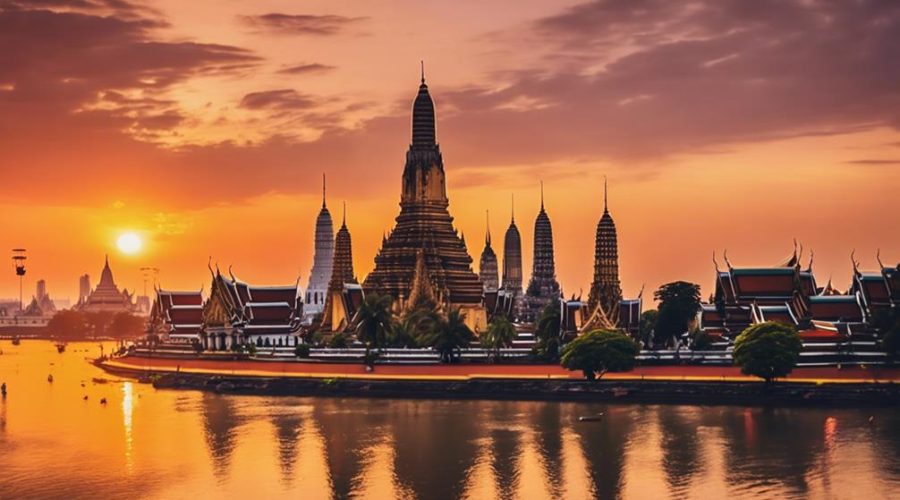What Is the Cultural and Spiritual Capital of Thailand?
Bangkok, the capital city of Thailand, is also its cultural and spiritual hub. It's a living showcase of Thailand's inherent respect for hierarchy and harmony. Buddhist principles of honesty, humility, and karma are deeply woven into daily life. Landmarks like Wat Arun and Wat Phra Kaew, adorned with intricate carvings and precious artifacts, embody Thailand's spiritual ethos. Festivals such as Songkran and Loy Krathong reveal a vibrant cultural mosaic, blending religion, tradition, and community. By exploring further, you'll appreciate how the monk lifestyle, Thai cuisine, and unique traditions enrich this dynamic cultural landscape.
Key Takeaways
- Bangkok, the capital of Thailand, is recognized as the cultural and spiritual heart of the country.
- Key cultural landmarks in Bangkok include historic temples like Wat Arun, Wat Phra Kaew, and Wat Pho.
- These temples bear unique cultural imprints, house sacred artifacts, and symbolize significant historical events.
- The city hosts vibrant traditional festivals that fuse culture and spirituality, reflecting Thailand's rich history and diverse influences.
- Bangkok's cultural and spiritual landscapes are deeply influenced by Buddhism, with monks playing a crucial role in society.
Understanding Thai Culture
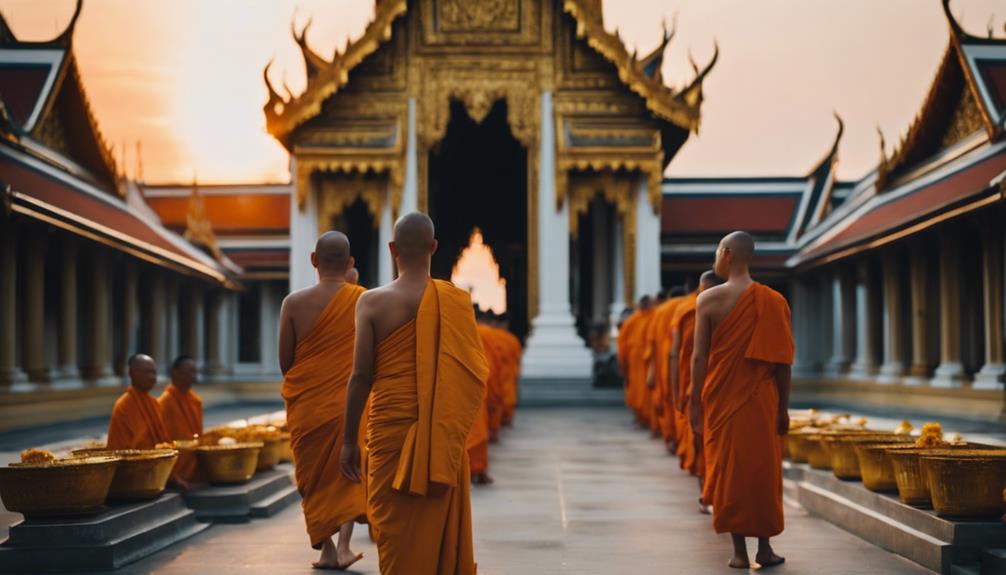
To fully understand the heart of Thailand, you must first explore its rich and complex culture, a vibrant tapestry woven with elements of spirituality, tradition, and social hierarchy. The Thai cuisine, famed for its fusion of sweet, salty, spicy, and sour flavors, isn't just a culinary delight but also a reflection of the country's geographical diversity and historical influences. You'll find that every dish tells a story, an enticing narrative of innovation and tradition.
Delving deeper, Thai culture presents a fascinating family structure that's deeply rooted in respect and hierarchy. The eldest, typically, holds the highest status, a reflection of the culture's reverence for wisdom and experience. This hierarchical structure isn't a rigid barrier, but rather a social fabric that fosters harmony and unity. It's an evolved system that encourages mutual respect, a sense of responsibility and a strong bond among family members.
To truly grasp the essence of Thailand, it's important to immerse yourself in its culture. By understanding the intricate blend of flavors in Thai cuisine and the nuances of their family structure, you're taking the first step towards appreciating this dynamic and vibrant nation.
Spirituality in Thailand
Delving into the spiritual domain, you'll find that Thailand is a nation deeply rooted in Buddhism, with nearly 95% of the population practicing this religion. Spirituality isn't just an aspect of Thai culture, it's woven into the very fabric of daily life, influencing everything from architecture to societal norms.
However, it's not confined to Buddhist temples or monastic rituals. The spiritual landscape of Thailand is also enriched by alternative spiritual practices. Let's focus on two key areas:
- Meditation Retreats: These are popular among locals and tourists alike, offering a unique opportunity to disconnect from the world and reconnect with oneself. They provide a platform for exploring mindfulness and personal growth, making them a magnet for seekers of spiritual enrichment.
- Thai Shamans: Often misunderstood and overlooked, Thai shamans operate on the fringes of mainstream Thai spirituality. They offer unique perspectives and practices that are rooted in ancient traditions and folklore, providing a rich tapestry of spiritual exploration.
The collective impact of these spiritual practices is profound, shaping Thailand's social, cultural, and even economic landscapes. It's a dynamic spiritual ecosystem that continues to evolve, reflecting the nation's openness to innovative spiritual ideas and practices.
The Importance of Buddhism
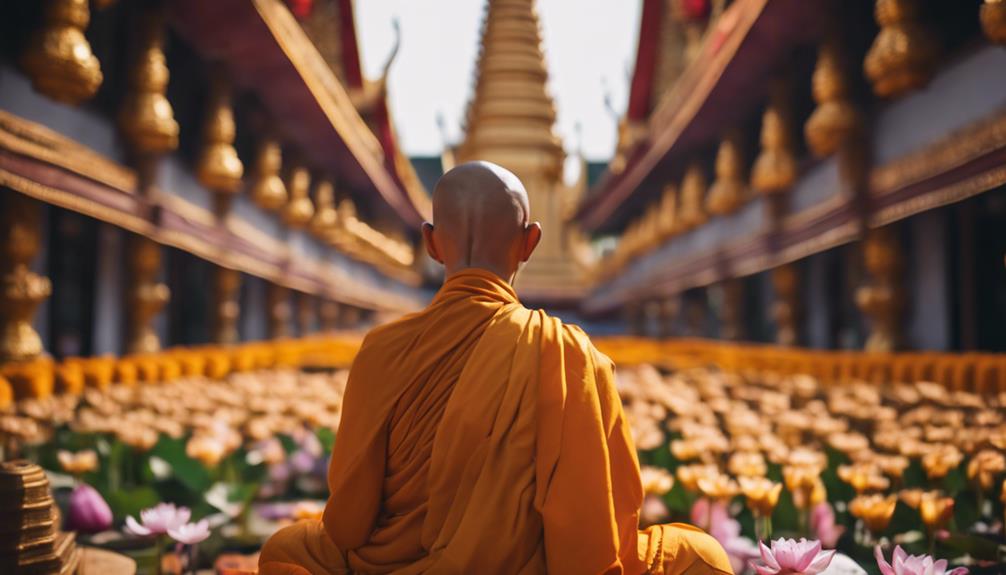
Buddhism isn't just a religion in Thailand; it's a powerful force that shapes every facet of Thai society, from personal behaviors to public policies. You'll find the teachings of Buddhist philosophy interwoven into the fabric of Thai culture, guiding principles of honesty, humility, and respect.
The monastic lifestyle, followed by monks and novices, is deeply respected and often sought after for periods of personal reflection and growth. It's not uncommon for Thai men to ordain as monks, even if temporarily, to cultivate wisdom and merit.
Now, let's explore some key aspects of Thai Buddhism and their societal implications:
| Buddhist Concepts | Influence on Thai Society | Examples |
|---|---|---|
| Five Precepts | Moral framework guiding personal behaviors | Avoiding harm to living beings, abstaining from stealing, sexual misconduct, lying, and intoxication |
| Karma | Accountability leads to responsible actions | Belief in the results of good and bad actions influencing one's future |
| Monastic Lifestyle | Fosters discipline, mindfulness, and personal growth | Temporarily ordination as monks by Thai men |
| Meditation | Promotes mental well-being | Widespread practice of meditation and mindfulness in daily life |
| Merit Making | Encourages generosity and community participation | Regular donations and offerings to temples and monks |
Thai Buddhism's impact is profound, shaping a diverse society, united by a shared spiritual ethos. It's more than a religion – it's a way of life.
Cultural Landmarks in Bangkok
As you traverse the streets of Bangkok, you'll encounter a rich tapestry of cultural landmarks – from historic temples to vivacious traditional festivals. Each temple tells a story, steeped in spiritual significance and architectural marvel.
You'll also be captivated by the city's unique performing arts, a tribute to Thailand's rich cultural heritage.
Historic Temples of Bangkok
In the heart of Bangkok, you'll find a wealth of historic temples, each bearing its unique cultural imprint and adding greatly to the city's rich spiritual landscape. These temples, rich in temple architecture, house sacred artifacts that serve as a proof of the city's deep-rooted spiritual traditions.
- Wat Arun: Known for its stunning design, Wat Arun symbolizes the birth of the Rattanakosin Period and the founding of the new capital after Ayutthaya fell.
- Wat Phra Kaew: It's not just a temple, but a complex of buildings that houses precious sacred artifacts including the Emerald Buddha.
- Wat Pho: Home to the 46-meter long Reclining Buddha, it's an epitome of divine craftsmanship and deep spiritual symbolism.
Each temple tells a story, offering a glimpse into Bangkok's vibrant cultural past and ongoing spiritual journey.
Bangkok's Traditional Festivals
Shifting our gaze from the spiritual landmarks, let's immerse ourselves in the vibrancy of Bangkok's traditional festivals, another essential aspect of the city's cultural heritage.
Each festival is a riot of colors, sounds, and emotions, with a plethora of festival foods and carnival rides adding to the excitement. You'll witness a culinary spectacle of traditional Thai cuisines, street foods, and exotic fruits, all integral to the festival experience.
Carnival rides, ranging from the nostalgic Ferris wheel to adrenaline-pumping attractions, draw crowds of all ages. These festivals, rooted in century-old traditions yet embodying a spirit of innovation, reflect the city's cultural dynamism.
Indeed, Bangkok's festivals aren't just celebrations; they're immersive cultural experiences.
Unique Thai Performing Arts
Diving deeper into Bangkok's rich cultural tapestry, you'll find an array of unique Thai performing arts that not only entertain but also tell compelling stories of the nation's history and traditions. These performances are a demonstration of the dance evolution that has occurred in Thai culture over centuries. They reflect a creative blend of tradition with modernity that continues to evolve.
- Thai Puppetry: This art form is deeply embedded in Thai culture and showcases intricate craftsmanship. Each puppet involves multiple performers, enhancing the complexity and uniqueness of the spectacle.
- Khon: This masked dance drama is a classic example of the dance evolution in Thailand, combining elements of drama, music, and martial arts.
- Likay Theatre: A popular form of folk theatre in Thailand, it's characterized by its improvisational nature, making each performance unique.
These unique performing arts provide a vibrant glimpse into the cultural heart of Thailand.
The Role of Temples
You'll find that temples in Thailand don't just serve as places of worship, but they also play a pivotal role in shaping the cultural and spiritual identity of the nation. The temple architecture alone exemplifies the nation's creative genius. Often adorned with intricate carvings, gilded façades, and towering spires, they're a reflection of Thailand's rich artistic heritage. You can't help but marvel at the fusion of symbolism and aesthetics in every temple, each a unique piece of the country's cultural mosaic.
Equally important is the monk lifestyle. Monks aren't just spiritual guides; they're also custodians of Thai culture. Their disciplined routines, humble demeanor, and austere living conditions inspire reverence and respect, reinforcing societal values of humility, patience, and mindfulness.
In the temples, monks carry out daily rituals, meditation sessions, and community services, fostering a sense of unity and shared spiritual experience among the locals. This active participation in the community's spiritual life deepens the bond between the monks and laypeople, reinforcing the temple's status as a center of social and spiritual cohesion. The role of temples, consequently, extends far beyond mere religious observance, shaping the very essence of Thai identity.
Festivals and Traditions
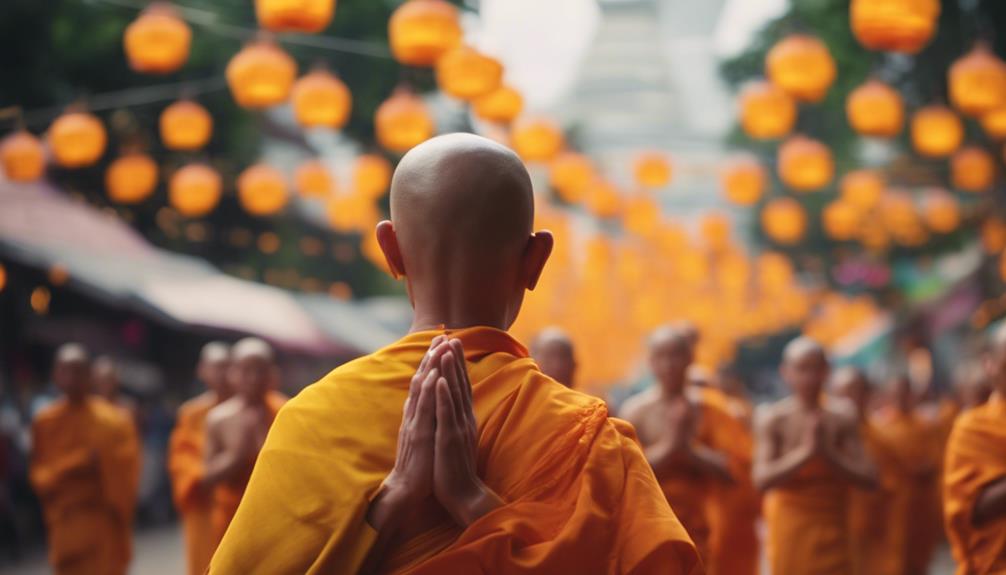
Now we'll shift your attention to the vibrant, festive side of Thailand: its festivals and traditions.
You'll find that Thai festivals, with their unique customs and rituals, aren't just a spectacle for tourists but are deeply steeped in local spirituality.
Celebrated Thai Festivals
Thailand's cultural tapestry is vividly displayed in its myriad of celebrated festivals, each infused with deep spiritual significance and ancient traditions.
You'll find that festival foods are a unique blend of traditional and innovative cuisine, often reflecting the region's rich history and diverse culinary influences.
Party etiquette, too, is an integral part of these festivities, demonstrating the locals' deep-rooted respect for customs and traditions.
To give you a sense of this vibrant cultural scene, here are three notable Thai festivals:
- Songkran Festival: Celebrated as the traditional Thai New Year, it's known for its water fights.
- Loy Krathong: A festival of lights where people float decorated baskets in the water.
- Vegetarian Festival: A nine-day event marked by strict vegetarianism and intense purification rituals.
These festivals offer a glimpse into the colorful, spiritual heart of Thailand.
Unique Thai Traditions
Beyond these well-known festivals, there exist a plethora of unique Thai traditions that further enrich the country's cultural mosaic. Take for instance, the integration of Thai cuisine into rituals. Many Thai ceremonies involve preparing specific dishes as offerings, such as 'khanom krok', a sweet coconut dessert for merit-making events.
Another unique tradition revolves around elephant conservation. The annual Surin Elephant Round-up festival, a spectacle showcasing the bond between Thai people and elephants, reflects the country's commitment to preserving these magnificent creatures. This event blends entertainment and education, offering you insights into the importance of elephants in Thai culture.
These traditions not only add to the vibrant tapestry of Thai culture, but also underscore the country's commitment to environmental stewardship and culinary innovation.
Spirituality in Festivities
Immerse yourself in Thailand's rich spiritual tapestry, where festivals and traditions serve as profound expressions of faith and spirituality. These ceremonies aren't just about the eye-catching spiritual artifacts and festival food, but they also provide a deep insight into the Thai spirit.
Examine the following elements that make these festivities spiritually enriching:
- Festival Food: This isn't just sustenance, but is a significant aspect of the ritual, embodying blessings and wishes.
- Spiritual Artifacts: These aren't mere objects; they're vessels of faith and devotion.
- Community Involvement: It's not just a gathering; it's a collective spiritual journey.
The Thai festivals are a fusion of culture and spirituality. They're a testament to Thailand's innovative way of preserving traditions while adapting to modern times.
Chiang Mai: The Spiritual Capital
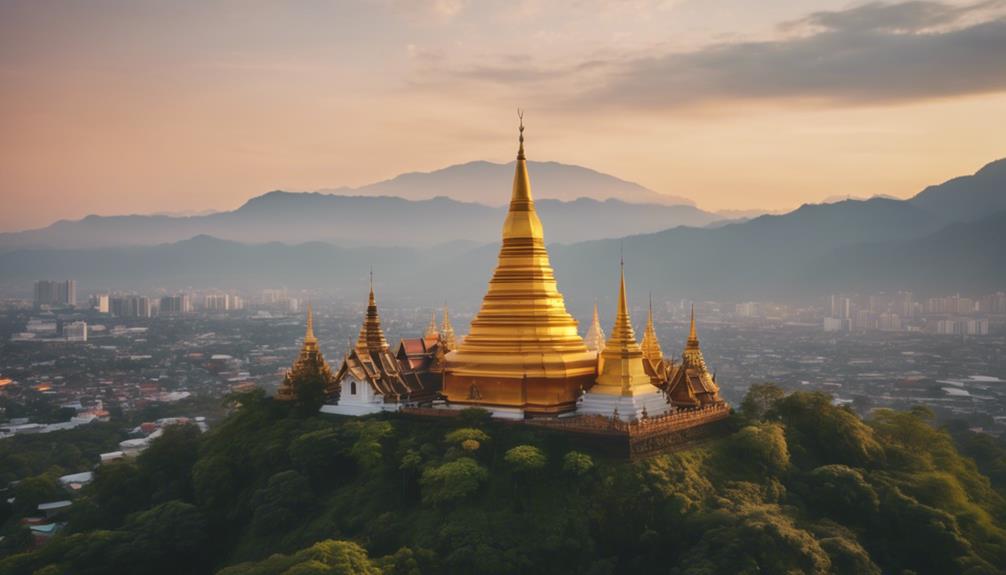
Nestled in the mountainous region of Northern Thailand, you'll find Chiang Mai, often referred to as the spiritual heartland, brimming with temples and shrines that reflect its rich Buddhist heritage. With the towering mountain views serving as a serene backdrop, you're invited to explore the city's innovative approach to preserving tradition in a rapidly modernizing world.
Chiang Mai's elephant sanctuaries are a proof of this harmonious blend of traditional and progressive practices. Here, the majestic Asian elephants are treated with the utmost respect and care, symbolizing a deep-rooted spiritual belief in the sanctity of all life. The sanctuaries offer an immersive experience, allowing you to interact with these gentle giants in their natural habitat, further solidifying the city's spiritual identity.
Chiang Mai's temples, like Wat Phra Singh and Wat Chedi Luang, are more than architectural marvels. They're living, breathing spaces of worship and contemplation, encapsulating the city's spiritual ethos. They inspire introspection and a profound connection to the Buddhist teachings, offering a timeless spiritual journey amidst the fast-paced modern world. Hence, Chiang Mai stands as the spiritual capital, where tradition and innovation coexist in a beautiful symbiosis.

